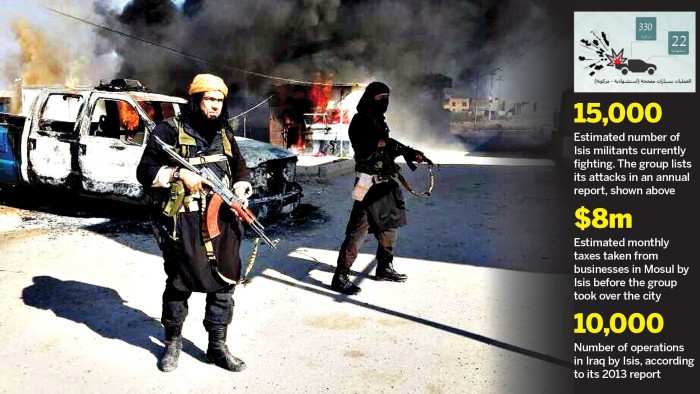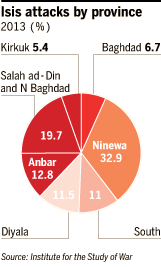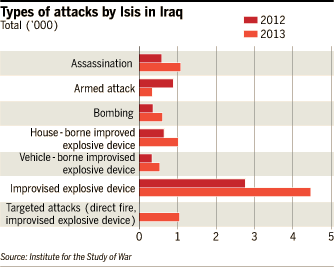Selling terror: how Isis details its brutality

Roula Khalaf, Editor of the FT, selects her favourite stories in this weekly newsletter.
It is not a corporation and does not have shareholders, but the military success and brutality of the jihadi group surging through Iraq have been recorded with the level of precision often reserved for company accounts.
Since 2012 the Islamic State of Iraq and the Levant, (known as Isis) has issued annual reports, outlining in numerical and geographical detail its operations – the number of bombings, assassinations, checkpoints, suicide missions, cities taken over and even “apostates” converted to the Isis cause.
In 2013 alone, the group’s report claimed nearly 10,000 operations in Iraq: 1,000 assassinations, 4,000 improvised explosive devices planted and hundreds of radical prisoners freed. In the same year it claimed hundreds of “apostates” had been turned.
Called al-Naba – the News – the reports for 2012 and 2013 (a year in which 8,000 civilians died in Iraq) have been analysed by the US-based Institute for the Study of War, which corroborates much of the information they contain. Isis’s aim appears to be to demonstrate its record to potential donors.
The reports paint a picture of an organisation that analysts say is not so much the ragtag terrorist band depicted by Iraqi officials but more of an organised military structure with a clear political strategy to set up a Sunni sectarian state – and one with several of the hallmarks of a corporate entity.
“The reports provide measures of performance in the way you roll out details for donors,” said Jessica Lewis, director of research at the Institute for the Study of War. “They affirm that the organisation operates like an army and that it has state-building ambitions.”
Nigel Inkster, former assistant chief of UK intelligence service MI6, and now director of transnational threats at the International Institute for Strategic Studies, said: “They produce [them] almost like a company, with details of martyrdom operations and targets. You have a clear overlay of structure, planning and strategy to the organisation.”
Isis’s ambition had been gradually unfolding over the past year but in the past week it has taken shape with lightning speed, with the territory under its control stretching from east of the Syrian city of Aleppo, across northern Iraq.
What is clear from the documents is that Isis’s campaign to control Sunni-populated Iraqi territory – and its capture of the second city of Mosul – should not have startled either the Shia-led government in Baghdad or its western allies. They highlight the extent to which Nineveh, the province that includes Mosul, seized last week, has long been a target.

The Institute for the Study of War’s analysis shows that 30 per cent of Isis attacks in 2012 and 2013 were in Nineveh, making the province the “primary attack zone” for the group.
“The number of attacks [in Iraq] has been rising steadily for months,” said John Drake, senior Iraq analyst at security firm AKE. “Now there are over a hundred people being killed every week. Isis has been getting stronger and stronger.”
Isis’s attacks have not been random acts of violence, as Iraqi reports suggest. “They have been steadily weakening the Iraqi security forces,” said Mr Drake, “picking off commanders in assassinations and driving down morale.”
Few who have been following closely the progress of the US-trained Iraqi security forces were surprised that so many of them appeared to have abandoned their posts in Mosul when Isis attacked, he added.
Isis now counts 15,000 hardened fighters in its ranks, according to regional experts, and, in addition to funds from private jihadi networks in the Gulf, it has developed internal sources of financing, through oil smuggling in Syria, racketeering and kidnappings.
Isis has seized oilfields in Syria’s Deir Ezzor province or made alliances with tribes to extract oil.
In financial terms, 2014 has been dramatically successful for the group, after fighters looted hundreds of millions of dollars from Mosul banks. According to the Council on Foreign Relations, Isis was already extorting taxes from businesses in Mosul before its takeover, netting perhaps as much as $8m a month.
Isis is the successor to the group that was known as al-Qaeda in Iraq and was so brutal in its methods that it drove Sunni tribes, with help and financial incentives from the US military, to turn against it in 2006. Isis learnt a lesson. “Isis decided the solution was better military power and that it should be a harder version of al-Qaeda,” said Ms Lewis.

And yet the group has adapted to new modern methods of spreading its message. Deft use of social media has been at the forefront of its campaigning tactics in Syria and Iraq. When it comes to using platforms such as Twitter, Isis is “probably more sophisticated than most US companies,” said Aaron Zelin, an expert on jihadis and fellow at the Washington Institute.
Before last week’s takeover of Mosul, Isis-linked accounts on Twitter were flooded with a co-ordinated campaign of hashtags and images, carefully calibrated to shock – and inspire.
Mr Zelin pointed to Isis activities on social media in Syria as having paved the way for their propaganda war in Iraq. Images stream out of Raqqa – the group’s stronghold in the north of the country – on Facebook, Twitter and YouTube depicting the proto-state it is creating there.
Isis’s use of social media has been one of the main reasons why it has become the single most popular organisation for fighters from foreign countries – including an estimated 2,000 from Europe, according to estimates from western intelligence agencies.
For all such successes, it remains to be seen whether Isis will be able to consolidate its grip in Iraq. In Syria, the group has long sparred with al-Qaeda’s official affiliate, Jabhat al-Nusrah, and alienated more moderate Syrian rebel groups, sparking battles that drove it out of Aleppo and much of Idlib in the north.
“The question [in Iraq] is how they will deal with the other insurgents,” said Mr Zelin. “For now, they are in a marriage of convenience of forces opposed to Maliki [prime minister Nouri al-Maliki].”
For all its attempts at building a disciplined, professional military striking force, analysts said the ferocity with which Isis pursues its ambitions could quickly alienate those it seeks to govern in its so-called Islamic state. “It’s the old problem of the scorpion and the fox,” said Mr Inkster. “The jihadi ideology contains the seeds of its own destruction.”
——————————————-
Letter in response to this report:
Hostile takeover / From Mr Tom Keatinge
Comments